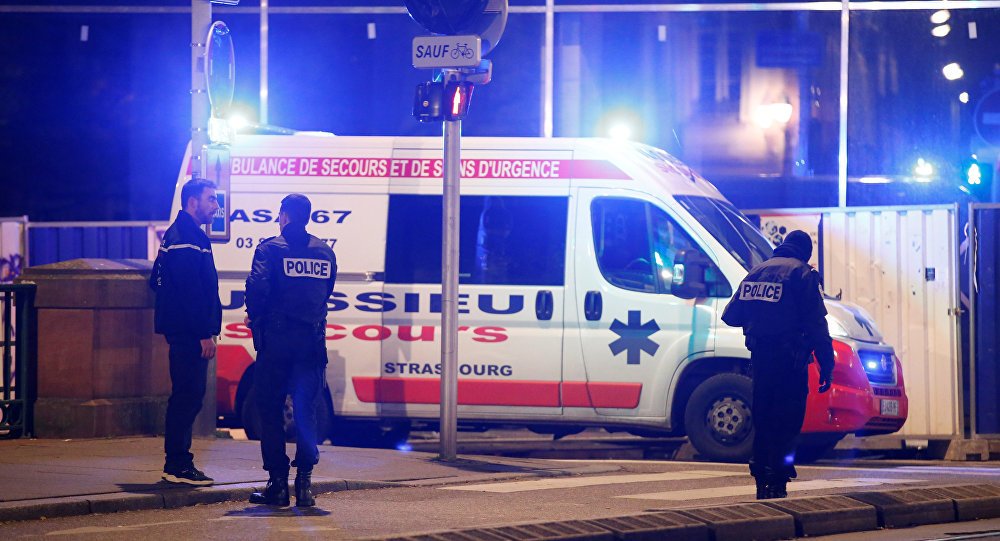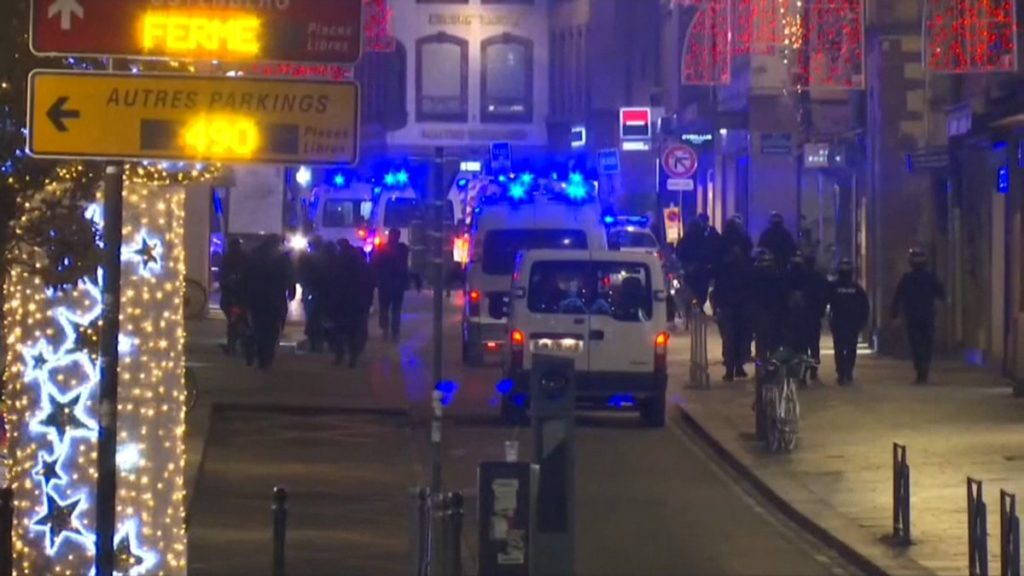A man who had been flagged as a possible extremist sprayed gunfire near the city of Strasbourg’s famous Christmas market Tuesday, killing three people, wounding 12 and sparking a massive manhunt. France immediately raised its terror alert level.
It was unclear if the market — a popular gathering place that was the nucleus of an al-Qaida-linked plot in 2000 — was the intended target. The assailant got inside a security zone around the venue and opened fire from there, Mayor Roland Ries said on BFM television.
Authorities did not give a motive for the shooting, though prosecutors said they had opened a terrorism investigation. Strasbourg is home to the European Parliament, one of several places that was locked down after the shooting.
Authorities said they had identified a suspect, and he had a criminal record. The prefect of the Strasbourg region said the man also was on a watch list of people who had potentially radicalized. No other details about him were disclosed.
Hours before the shooting, French gendarmes went to the suspect’s home to arrest him, but he wasn’t there, Stephane Morisse of police union FGP said. They found explosive materials during a search, he said.
France, where most of Europe’s worst terror attacks of recent years took place, was raising its terror alert level and sending security reinforcements to Strasbourg, Interior Minister Christophe Castaner said early Wednesday.
The attack in Strasbourg came two years after a Tunisian man drove a hijacked truck into a busy Berlin Christmas market, killing 12 people. Strasbourg, which promotes itself as the “Capital of Christmas,” is located on France’s border with Germany, about 500 kilometers (310 miles) east of Paris. The market is set up around the city’s cathedral during the Christmas season.
Some 350 security forces and two helicopters were searching for the alleged assailant, who had been radicalized for “several years” and confronted law enforcement officers twice while he “sowed terror” in Strasbourg, Castaner said.
The death toll stood at three early Wednesday, he said. Two police union officials said earlier there were four victims. Officials did not explain the conflicting numbers.
A dozen more people were wounded, half of them in “absolute emergency” critical condition, Castaner said. The shooter was also shot and wounded by soldiers guarding the Christmas market, according to Stephane Morisse of police union FGP.
French military spokesman Col. Patrik Steiger said the shooter didn’t seem to be aiming for the soldiers patrolling in and around the market, but appeared to target civilians instead.
Witnesses described hearing gunshots, screams and shouts of police officers ordering people to stay indoors before the area fell silent and the officers fanned out.
“I heard two or three shots at around 7:55 p.m. (1855 GMT), then I heard screams. I got close to the window. I saw people running. After that I closed the shutters. Then I heard more shots, closer this time,” Yoann Bazard, 27, who lives in central Strasbourg.
“I thought maybe it’s firecrackers,” he said, speaking by phone. “And then, as it got close, it was really shocking. There were a lot of screams. … There were police or soldiers shouting ‘Get inside!’ and ‘Put your hands on your head.’”
Freelance journalist Camille Belsoeur was at a friend’s apartment when they heard the gunfire, which she at first mistook for firecrackers.
“We opened the window. I saw a soldier firing shots, about 12 to 15 shots,” Belsoeur said,
Other soldiers yelled for people to stay indoors and shouted ‘Go home! Go home!’” to those outside, he said.
Another witness, Peter Fritz, told the BBC one of the four people killed was a Thai tourist who was shot in the head and didn’t respond to lengthy attempts to revive him.
“We tried our best to resuscitate him. We applied CPR. We dragged him into a restaurant close by,” Fritz said.
He said it took more than 45 minutes for an ambulance to arrive, during which time an emergency doctor advised by telephone “that any further efforts would be futile.”
The victim “is still here in this restaurant but we have abandoned all hope for him,” Fritz said.
France previously endured several high-profile extremist attacks, including the coordinated attacks at multiple Paris locations that killed 130 people and wounded hundreds in November 2015. A 2016 truck attack in Nice killed dozens.
President Emmanuel Macron adjourned a meeting at the presidential palace Tuesday night to monitor the emergency, his office said, indicating the gravity of the attack.
Castaner and the Paris prosecutor, who is in charge of anti-terror probes in France, headed to Strasbourg. The prosecutor’s office said the investigation was being conducted on suspicion of murder and attempted murder in relation with a terrorist enterprise charges, suggesting officials think the alleged shooter may have links to extremists.
In multiple neighborhoods of Strasbourg, the French Interior Ministry urged the public to remain indoors. Local authorities tweeted for the public to “avoid the area of the police station,” which is close to the city’s Christmas market.
European Parliament spokesman Jaume Duch said that “the European Parliament has been closed and no one can leave until further notice.” It wasn’t immediately clear how many people were inside.
The attack revived memories of a new millennium terror plot targeting Strasbourg’s Christmas market. Ten suspected Islamic militants were convicted and sentenced to prison in December 2004 for their role in a plot to blow up the market on the New Year’s Eve ushering in 2000..
The Algerian and French-Algerian suspects — including an alleged associate of al-Qaida leader Osama bin Laden — went on trial in October on charges they were involved in the foiled plot for the attack.
They were sentenced to prison terms ranging from one to nine years.



(AP)












2 Responses
The scary part of a growing number of these “lone wolf” attacks is that they are coming from “self-radicalized” residents of the country where the attacks occur. In this case, the attacker was born in France and was already on the radar screen of French security police. Similar stories in other European countries and in some of our own attacks by white supremacist and muslim radicals who are already in the country and where a “wall” would have zero defensive effect. The advantage we have is the number of potential self-radicalized terrorists is relatively small compared to Europe and hopefully we can do a better job of predicting which are the greatest risk and monitor their activity. In Europe and the UK, the numbers of potential terrorists literally overwhelm the ability of the security forces to monitor.
I think that Hashem tells to French, that it’s time to STOP with all the פריצות and לחזור בתשובה
sure that it’s a calling for us to.